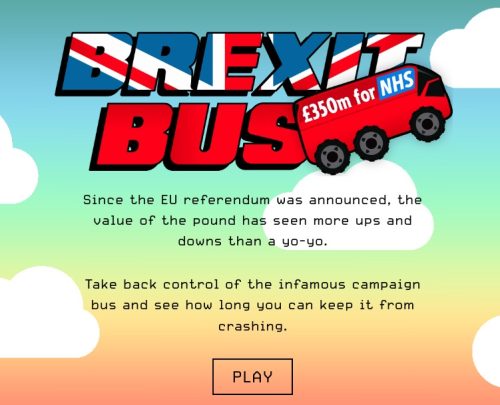There's a Big Number Written on the Side of a Bus
The Brexit Bus Lie
The “Brexit battle bus” has come to symbolize the litany of untruths thrown about like Smarties during the run-up to the EU referendum.
The Leave campaign’s blatantly untrue claim that Turkey were about to join the EU faded into insignificance once the populace were presented with another, more emotionally charged lie which had been emblazoned on the side of their gaudy bus. Suddenly, out of the blue, our EU membership was said to be exacerbating a crisis in our beloved NHS. And nowhere was this myth more evident than on the so-called ‘Brexit battle bus.’ Oh yes, who could forget the infamous Brexit bus promise to send £350 million a week to the NHS, rather than to the EU?
The slogan on the bus implied that our EU membership was effectively robbing our precious NHS of much-needed funds. This was indeed a compelling implication—one that resonated with millions of people and ultimately ensured the referendum vote swung in favour of Leave.
In February 2017, Dominic Cummings said the slogan was one of the main reasons why the Leave campaign won the EU referendum. Writing in the Spectator, he said: “Would we have won without immigration? No. Would we have won without £350m/NHS? All our research and the close result strongly suggests No.”
One study even found that former “Labour Leavers” who voted for Johnson in the 2019 general election cited his Brexit promises on the NHS as their main motivation.
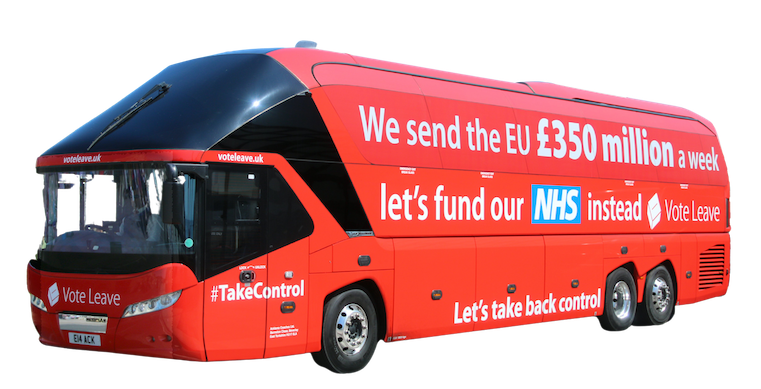
But seven years down the line, it seems the NHS is in more trouble than ever before, with health worker strikes, longer waits in A&E, record staffing shortages, and unacceptably long patient waiting lists. Health think tank, the Nuffield Trust said it’s likely that the decision to leave the EU may also have encouraged EU workers in the NHS to leave the health service.
And little wonder…
In the immediate aftermath of the referendum, several Leave politicians admitted that it wouldn’t be possible to divert £350m a week to the NHS. A number of Tory MPs said that even if this Brexit bonus existed, the entire amount couldn’t be allocated to the NHS anyway. After all, the Leave campaign had also promised farmers that they would not be worse off as a result of Brexit.
Despite such statements from ministers in his own cabinet, Boris Johnson saw fit to repeat the £350 million claim in a 4,000-word essay in the Daily Telegraph in September 2017.
Sir David Norgrove, the UK Chief of Statistics, criticized the then foreign secretary’s use of the £350 million figure as “clear misuse of official statistics.” In response to the criticism, Johnson said his words had been interpreted in a crassly simplistic way and that it was a “wilful distortion.”
Yet, how else are you meant to interpret a “crassly simplistic” slogan??
A Calculated Deflection?
During a Talk Radio interview in June 2019, Johnson was asked how he switches off from politics. He replied that he painted buses on wooden crates, prompting The Guardian to call it out as “a pointless, obvious lie. One there had been no need to tell.”
Following the subsequent, inevitable mainstream media coverage, Vote Leave bus slogan searches dropped sharply in internet search rankings, as people scrambled to find out more about Boris’s bus “hobby.” Some commentators believed that this was a deliberate SEO (search engine optimisation) ploy to bury information about the Brexit bus. Surely not?

The Actual Figures Don’t Lie
With the negligible benefit of hindsight, let’s look a little more closely at that £350 million claim.
The Office for National Statistics found that, in 2015, the UK actually made a net contribution of around £199 million a week to the EU. The actual—somewhat more modest—figure was revealed in 2017 when the ONS published their breakdown of the UK’s current account (otherwise known as the ‘Pink Book’).
The figures showed that, although the UK’s annual gross contribution to the EU was approximately £19.6 billion (equivalent to £376 million a week, which is actually more than the number on the bus), this didn’t take into account the huge cash rebate the UK received from the EU—valued at £4.9 billion.
Once you deduct this £4.9 billion from the £19.6 billion, you’re left with £14.7 billion.
Then you also have to deduct the substantial payments the EU made to the UK’s public sector (e.g. regional grants for deprived areas and income for farmers from the Common Agriculture Policy)—valued at £4.3 billion. This leaves a net figure of £10.4 billion—equivalent to £199 million a week. Hardly £350 million then, is it?
The UK’s independent Statistics Authority also backed up the ONS information. It stated that the £350 million a week membership fee, is “not an amount of money that the UK pays to the EU each year”. They posited that it was, in fact, roughly what the UK would have paid before deducting the rebate and other EU income.
And, far from saving billions, the Office for Budget Responsibility estimate that Brexit will cost the public finances £42bn in lost tax revenues.
Not to mention that we are also paying a Brexit ‘divorce bill’ of around £34bn over the next few years, according to the Institute for Fiscal Studies.
Does anyone recall seeing any of these figures on the side of the Brexit bus?
How do people feel about Brexit now?
The thorny issue raises its ugly head every now and then in the mainstream news, but not as often as one might expect. In-depth analyses about how post-Brexit UK is doing are also a bit thin on the ground. However, there have been several surveys carried out to assess public sentiment about the whole sorry saga a few years down the line.
The most recent surveys show that the majority of respondents now believe the UK made the wrong choice to leave the EU (known as “Bregret” in some circles). In fact, a growing number of Leavers would even like to rejoin the EU, with many expressing anger that they were grossly misled by a bunch of duplicitous tricksters in 2016. A poll from Unherd and Focaldata even showed that all but three UK constituencies now believe Brexit was a mistake.
Former Tory donor, Guy Hands told the BBC Today Programme that Brexit was “a complete disaster” and “a bunch of total lies.” before adding, “…you can take the Brexit bus as a good example… the lies that Boris Johnson and the Conservative party told about the NHS. In fact, what they did was throw the country and the NHS under the bus.”
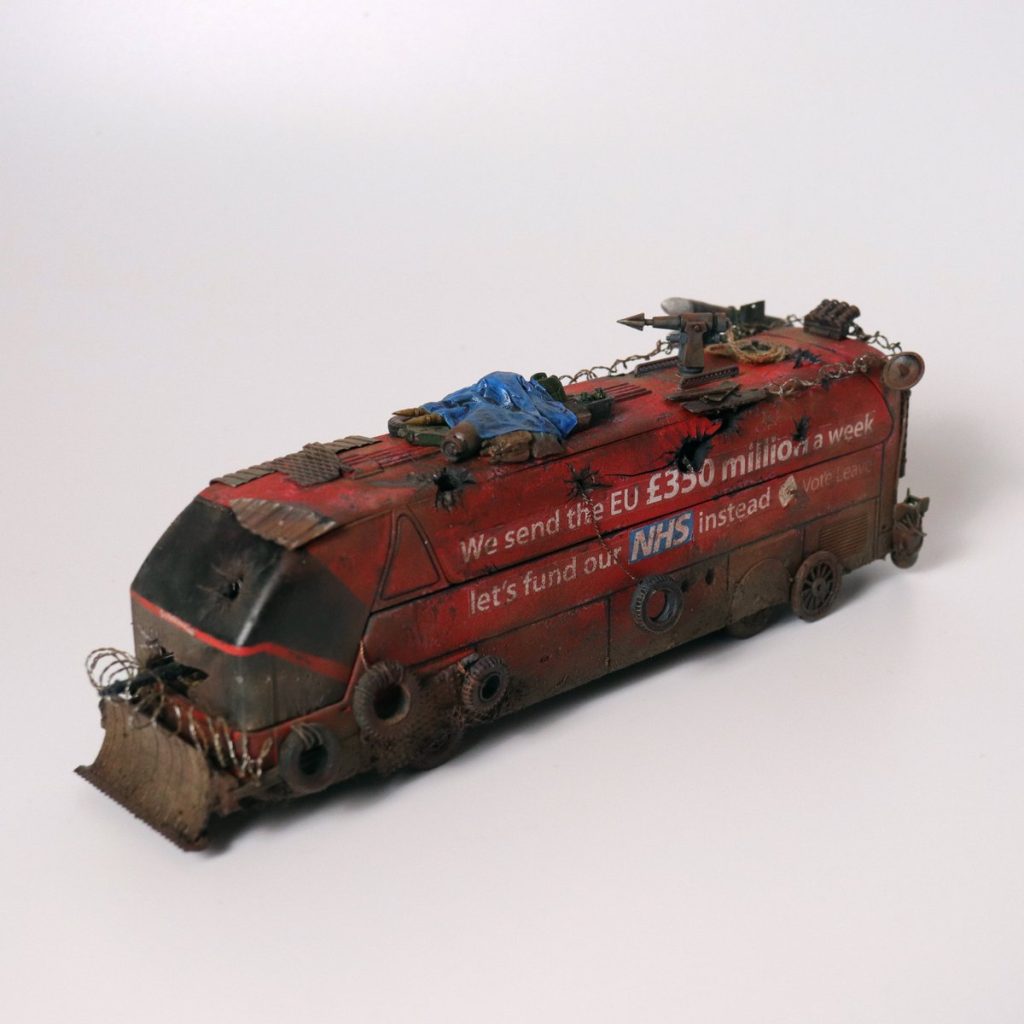
I Beg Your Pardon… The Brexit Bus Promised Me A Rose Garden!
So, what about the Brexit Bus promise? 52% of us were expecting our wonderful NHS to be burgeoning by now. After all, we were promised dozens of fancy new hospitals with state-of-the-art equipment operated by super-intelligent, highly-qualified health professionals from Australia, Israel, India and Canada. So, today we should be enjoying some sort of post-Brexit healthcare utopia—a brave new world where waiting lists and record staff vacancies are a thing of the past. Shouldn’t we? Apparently not…
Rather, with the increased costs following the drop in the pound and the unresolved issue of the “divorce bill,” it is highly improbable that our struggling healthcare service will receive any extra funding any time soon.
In 2017, The Lancet published an article which concluded that “ the process of leaving the European Union (EU) will have profound consequences for health and the National Health Service (NHS) in the UK.” Here is a longer extract from the article:
“In this paper, we use the WHO health system building blocks framework to assess the likely effects of three scenarios we term soft Brexit, hard Brexit, and failed Brexit. We conclude that each scenario poses substantial threats. The workforce of the NHS is heavily reliant on EU staff. Financing of health care for UK citizens in the EU and vice versa is threatened, as is access to some capital funds, while Brexit threatens overall economic performance. Access to pharmaceuticals, technology, blood, and organs for transplant is jeopardised. Information used for international comparisons is threatened, as is service delivery, especially in Northern Ireland. Governance concerns relate to public health, competition and trade law, and research. However, we identified a few potential opportunities for improvement in areas such as competition law and flexibility of training, should the UK Government take them.”
Of course, the choppy waters have been muddied ever so slightly by a global pandemic and the war in Ukraine, both of which have created a convenient smokescreen for the UK government and other Brexit pioneers to cower behind. (If I was a conspiracy theorist, I would be having a field day with this – I’m honestly surprised that it’s not a thing).
But hardcore Brexiteers can’t deny the significant trade and growth differential between the UK and other comparable European economies, all of which have also been hit by Covid, rocketing gas prices, and runaway inflation.
The International Monetary Fund (IMF), have said that the UK is projected to underperform all other major countries in 2023. And, according to the latest World Economic Outlook, the UK economy is expected to contract by 0.6% in 2023, which is a significant downward revision from the 0.3% growth forecasted in October 2022. In contrast, all other G7 advanced nations are expected to experience economic growth.
Surely it’s obvious to anyone with half a brain that all this is down to the glaring elephant in the room.
Promises, Promises...
Let’s take a look at some of the failed promises made by Johnson and Vote Leave in 2016:
- We can obtain a better deal compared to our previous deal with the EU.
- We will retain identical benefits to EU membership.
- An additional £350 million a week will be available for the NHS.
- The Northern Ireland border will remain unaffected.
- Farmers stand to gain from our departure from the EU.
For seven long years, Johnson has continued to utter untruths and spread misinformation, even as Brexit and its ensuing repercussions continue to drag our cherished health service and what’s left of our tiny island down the shitter.
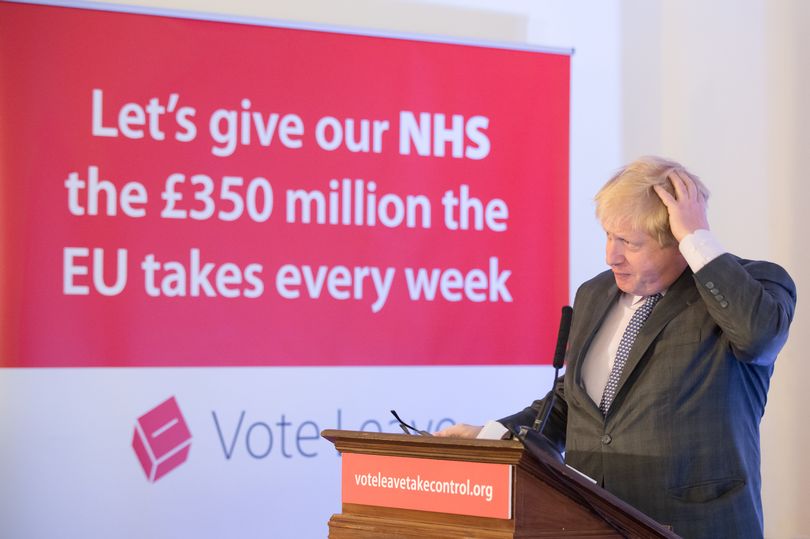
Have a go with this video game, and track the value of the pound since the EU referendum in 2016. A cartoon Brexit bus navigates the peaks and troughs of the actual currency graph. The aim is to stop the bus from crashing. Yup, just like the spectacular crash that happened when Liz Truss was driving the economy in September 2022.
What happened to the Brexit Bus after the EU referendum?

In 2016, Greenpeace acquired ownership of the Brexit bus. Parking it outside Parliament, they gave it a much-needed rebrand. The £350m/NHS lie on the side of the bus was concealed with thousands of questions for the government from both Leave and Remain voters – many of them about the implications of Brexit on the environment. Written on stickers, the questions were arranged to spell out the phrase, ‘TIME FOR TRUTH’ in striking white letters.
The following year, the Brexit Bus was hired by Monese – a UK challenger bank. They took it on tour to advertise the company’s expansion to mainland Europe, offering €350 million in fee-free money transfers between its UK and Eurozone accounts.
On the rear and passenger-door of the Monese bus, it said “#FreeMovement” – presumably a reference to money rather than people. The side of the bus read “Send €350 million with zero fees. UK and EU banking for everyone.” This claim is arguably even worse than the £350m/NHS lie. Do they mean “banking for everyone” or do they mean “banking for oligarchs who happen to have hundreds of millions of pounds to convert into euros”?
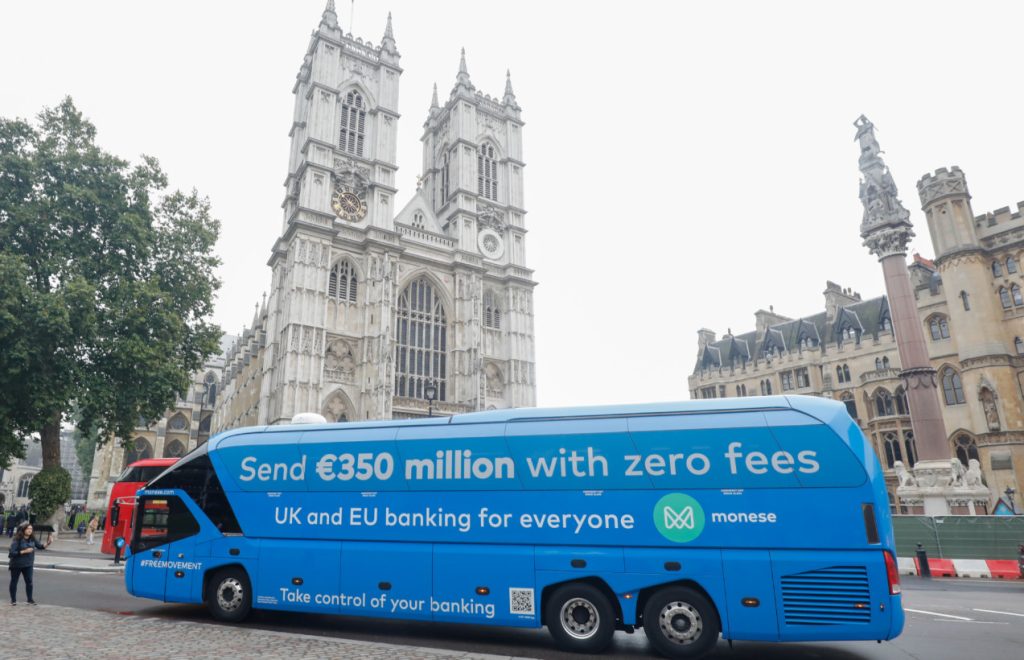
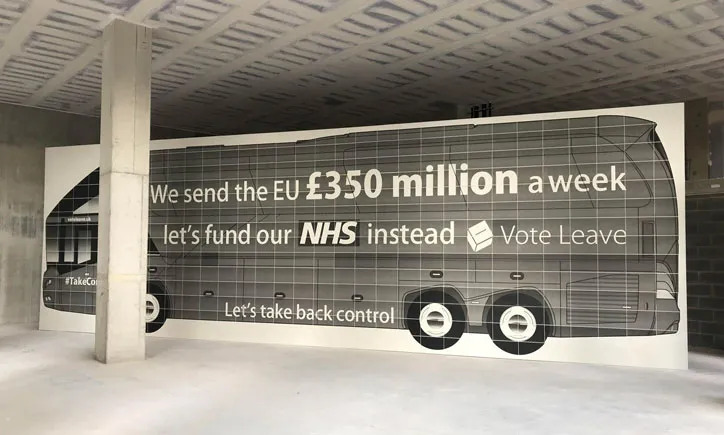
In 2019, the Brexit Bus was back – but not as we know it. The bus was recreated as a book and exhibition in a collaboration between graphic designer Fraser Muggeridge and the author/publisher, Arnaud Desjardin. The project served as a reminder of the contentious methods used to influence voters: “British citizens were asked: ‘Should the United Kingdom remain a member of the European Union or leave the European Union?’ Three years on, the question remains unresolved.”
The scale of the Brexit Bus collage was impressive. Four metres tall and 13 metres long, the installation comprised 436 A3 sheets of black and white prints. The collage was displayed in the Tate Modern’s Turbine Hall in 2019. It was also collated as a book, with a limited print run of 100 copies.
Crowdfunding Campaigns
A few years ago, a crowdfunding campaign was launched by CRUX Street Art & Design. It’s mission? To “resurrect the infamous Brexit bus, give it a post-apocalyptic makeover and haunt Boris Johnson around Britain.” The campaign even set out step-by-step directions:
Step 1: Acquire a bus
Step 2: Redecorate bus
Step 3: Hook up a sound system
Step 4: Roadshow! We’ll take the bus on the road to Westminster, Dominic Cumming’s house, Tory party conferences. Wherever!
Step 5: Auction the bus off and donate proceeds to local food banks.
Sadly, the campaign didn’t gain a single supporter and Boris’s “Ghost of Christmas Past” experience was not to be.
A travesty, really.
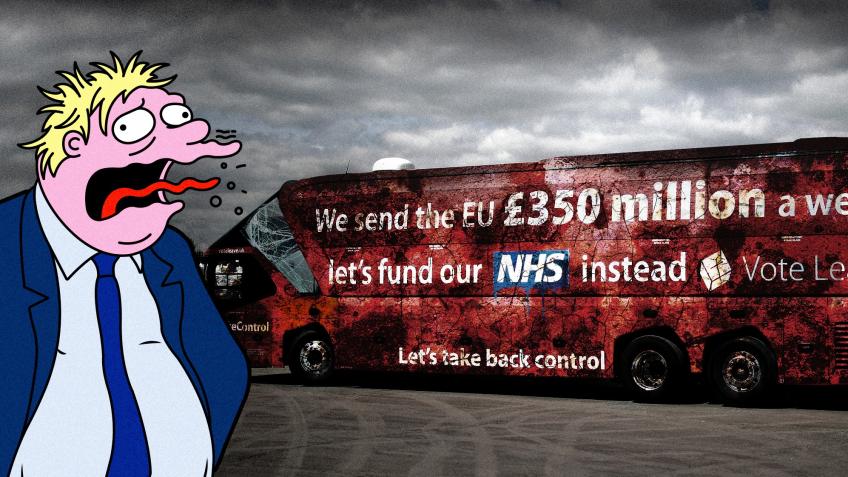
CRUX wrote some canny responses to questions about their campaign:
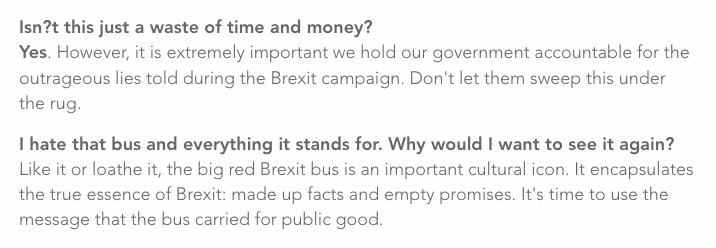
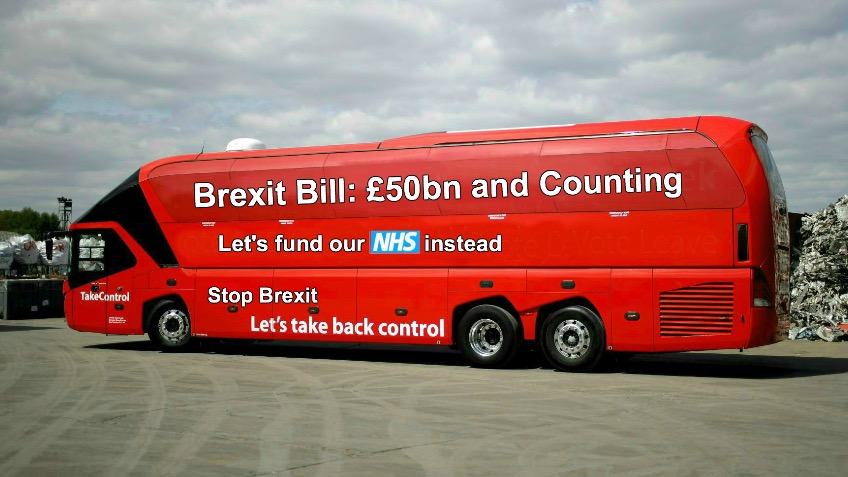
On a brighter note, Camden for Europe – a group affiliated to Britain for Europe and the European Movement – had more luck with their crowdfunding campaign. In 2018, they managed to raise over £16,000 in just 28 days:
“The £50bn and counting bus will tour the country and we will invite MPs to join the bus when it reaches their constituencies – we have already had acceptances. We will certainly stop outside Parliament, the BBC and the London homes of some of the extreme Brexiteers in the Cabinet.”
A Google search reveals that the bus did indeed visit towns and cities around the UK, including Bristol and Worcester, but there seems to be no media coverage of the bus parking outside the London homes of Brexiteers. Which, of course, doesn’t mean it didn’t actually happen. I only wish I had been there when Rees-Mogg opened his front door to be faced with the “Brexit Bus of Truth.”

